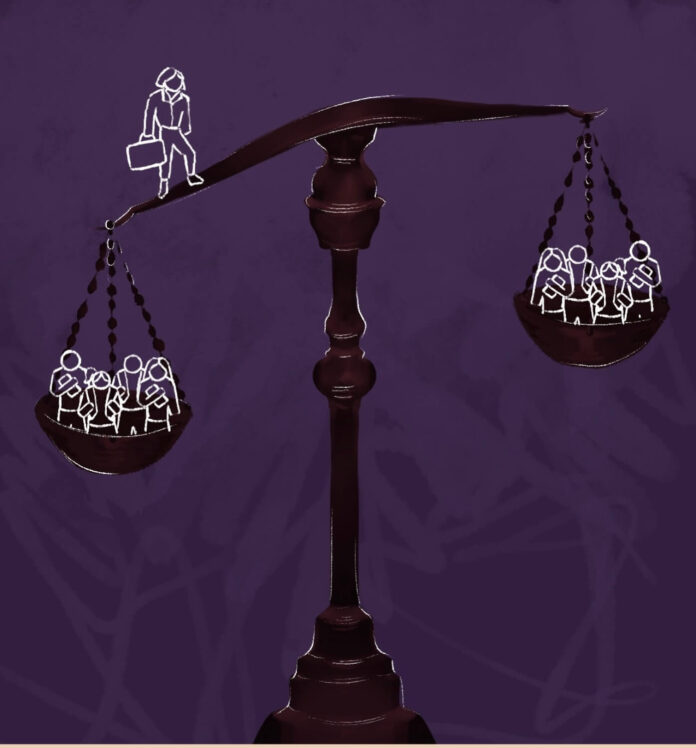Focus on the feeling you get when someone drops a hot political take you don’t agree with. It usually kicks down the mood by at least three notches, and leaves you with only a couple of options.
One, you can push back, start a discussion. This allows you to try to correct a view you consider wrong, but it also risks starting an argument and damaging a relationship or social environment.
Two, you can ignore it. Maybe this means changing the subject, cracking a joke or just awkwardly laughing and hoping people move on. On one hand, this almost certainly preserves the stability of the relationships involved. On the other, you don’t challenge the perceived wrong belief and you smother your own voice, often to the point of personal discomfort.
Both of these options are valid in most circumstances. When out with friends or at the dinner table, these tools can be very useful. But in the classroom, when the controversial opinion is from the instructor, everything changes. All your options are taken away. You can’t really push back to start a discussion, because they are your superior and can shut down or brush away any resistance. This becomes especially true when the politics in question are only loosely related to the subject of the course: the instructor has the perfect excuse to move on. And you can’t really ignore it either. You’re in the classroom to learn, and when you start doubting your professor’s judgment, this learning becomes difficult. We all naturally don’t want to learn from someone we disagree with or don’t trust. It feels self-contradicting.
I’ve been in this situation myself. In my first year of high school I had a math teacher who rather adamantly supported Donald Trump in the 2016 election, and made no attempt to hide it. In one instance she brought up Trump’s decision to refuse the presidential salary, praising him as a selfless hero of the United States. I felt the urge to point out that Trump hadn’t severed ties with his businesses, that this decision was nothing more than performative. But I didn’t say any of those things. I felt suffocated. To speak out would be social suicide in my largely right-leaning high school; to press back at all would lead to an uncomfortable awkwardness between the teacher and me for the rest of the school year.
At Occidental, I found myself noticing a similar catch-22. Professors casually brought up the Jan. 6 riots, or mentioned issues they have with the Biden Administration, and I realized that to voice an opinion would potentially lead to intense judgment. The scale of these disagreements paled in comparison to those I had in high school — yet the same discomfort persisted. This phenomenon persisted with non-political topics as well: discussions on essay writing tactics or artistic preference. Reflection made clear to me that this discomfort didn’t come from the strength of my disagreement, but rather from the lack of a voice to express it.
That’s the problem I want to highlight. Dissent is important, and creating environments where dissent cannot be expressed will only further the problem. On top of causing students to lose interest and participate less in class, it could make someone feel ostracized and out of place, falsely invalidating their identity or values. The trick is figuring out how to avoid creating these environments.
Instructors play an important role in that task. If they wish to discuss politics at all, they need to take active efforts to allow students to disagree. I understand the danger of derailing a classroom discussion with heated debate, but there are ways around this. An instructor could open up time out of class, over email or in office hours, to discuss any disagreements that students may have. They could take after one of my professors this semester and put a form up on Moodle that students can fill out with comments, thoughts or concerns. These fairly simple steps may not seem like much, but even just providing an outlet for these conversations to happen has the potential to make the classroom environment feel more inclusive, understanding and open.
Students play a role though, too. Political opinions often get packed in snug with morality, and the instinct is to immediately throw out opposition as wrong without taking time to properly consider it. This instinct can do just as much damage to healthy discourse as a professor limiting discussion. That social suicide I mentioned comes from peers, and is a very heavy weight to lift. It too can ostracize and inhibit an individual’s identity. As such, when someone dissents, it is on us, the students, to listen and engage. If after taking that time to understand you still disagree, that’s great — tell them. But do so respectfully, and only after making an active effort to hear them out.
Let me be very clear. This process changes if the discussion is actively damaging. There is a danger in creating a false equivalency between bigotry and its opposition; racist arguments shouldn’t be granted the same intellectual validity as arguments for equality. Where that line in the sand is drawn, however, may require discussion. Or maybe not. The only way to know is by listening first.
It’s not the strength of the disagreement, but the ability to express it that matters. It’s on all of us, professors and students, to make sure that healthy, constructive environments are created.
![]()































